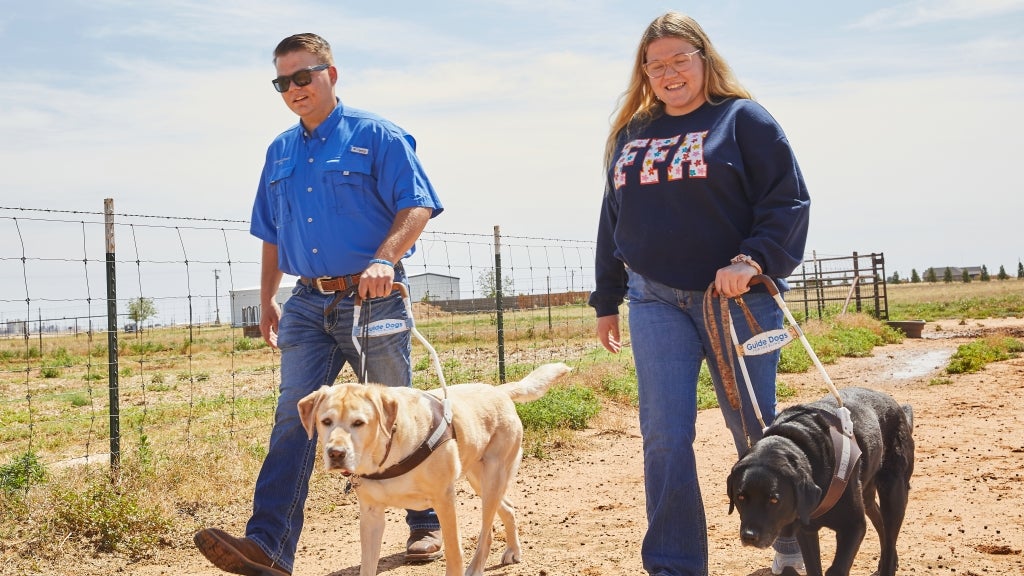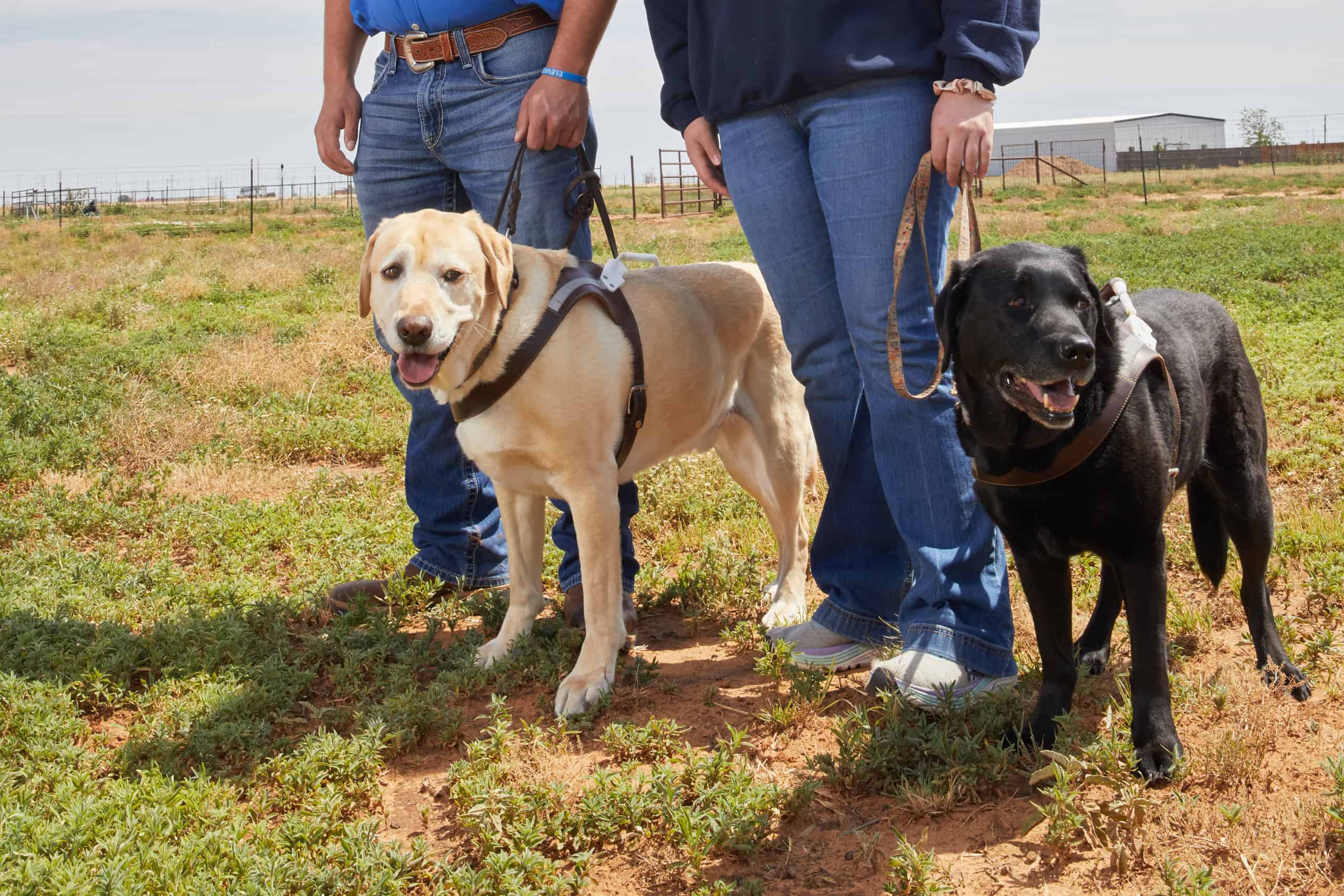
Faith and Caleb Snapp were born 13 weeks premature and diagnosed with zone 1 retinopathy of prematurity, a lack of development in the retina that affects vision. Although this diagnosis caused them to be legally blind and presented challenges, it didn’t stop the now 23-year-old fraternal twins from creating big ideas for the future — and they credit FFA for helping them pursue their dreams.
“I felt at home. FFA always treated me just like everyone else and always gave me the same opportunities, no questions asked,” Faith Snapp says. “More than anything, I realized if [FFA] was going to allow me to not be limited, I wanted to see where it could take me. I kept pushing.”
Caleb had a similar experience and considers the Lubbock-Cooper FFA Chapter in Texas “a second family” that exposed him to diverse people and experiences — all of which helped shape his future.
“Having such a large community of people who come together and hearing different people’s voices was really cool,” he says. “It made more and more opportunities blossom in our lives.”
A Guiding Force
Faith and Caleb grew up around animals in Lubbock, Texas. Their mom, Angie Snapp, an agricultural education instructor and Lubbock-Cooper FFA advisor, owned horse stables and ran riding camps, while their older sister, Jacey, started showing Boer goats when the twins were in kindergarten. The Snapp twins started raising their own goat herd in the third grade and participated in all aspects of their care, from feeding and medicating to teaching others about livestock species.
Although Faith loved the family’s livestock, she shifted her attention to a different animal: a dog.
“I first learned about Guide Dogs for the Blind when I was 13,” she says. “My mom went to her first Texas FFA state convention and [the organization] had a booth. She brought home a pamphlet, and I thought it was so cool. I wanted to [volunteer to raise puppies that would be trained as guide dogs]. I didn’t think about the fact that I would qualify for a guide dog.”
Guide Dogs for the Blind had a rule that all applicants for service dogs were required to be 18 years old. Faith applied at 14 and thought, “The worst thing they can tell me is ‘no.’”
To Faith’s surprise, she got a call and was invited to go through the process to be matched with a dog. The process was intense, requiring both a phone interview and home visit that included having a trainer follow Faith at school, at home and on activities to ensure she could navigate the world with a dog. In 2017, Faith was matched with a trained black Labrador Retriever named Prim.
“I’ll never forget the day I got the call and they told me I’d been accepted,” Faith says. “She didn’t even finish her sentence and I was already crying. It was the best day ever.”
To prevent Faith from tripping, Prim alerts her to elevated surfaces like curbs, stairs and cracks in the sidewalk. She also alerts Faith to overhead obstacles, helps her navigate through a crowd and knows how to find Angie in a store or crowded environment. Prim also practices what Faith calls “intelligent disobedience,” which includes refusing commands if she recognizes a danger.
“If I’m crossing a street and tell her to go but there’s a car coming that I can’t see, she won’t let me move,” Faith says. “If a car comes and we’re in the road, she knows how to push both of us back on the curb or pull us out of the way, which is really cool.”
Prim was even trained to feel comfortable around livestock and accompanies Faith when she shows goats.

Grit(left) and Prim (right) instill a sense of self-confidence and independence in Caleb and Faith Snapp.
Watching Faith work with Prim allowed Caleb to see how a guide dog could help him, too. In 2018, he applied for a guide dog through the Guide Dogs for the Blind program and was matched with a yellow Labrador Retriever named Grit a few months later.
“Just like Faith, when I got the phone call, I was bawling the entire time,” Caleb says.
Prim and Grit were adorable fixtures in Lubbock-Cooper FFA. Prim was at Faith’s side while she participated in leadership development events and vet science and agricultural issues competitions, while Grit accompanied Caleb to agricultural mechanics classes and meat judging and radio competitions. Faith and Caleb also earned their American FFA Degrees.
While their guide dogs helped Faith and Caleb navigate the world, FFA helped the twins tap into their unique interests and develop their skills.
“Being twins, they’re very different. They have different skill sets and interests, but they both found a place in FFA,” Angie says. “This organization has gone above and beyond to accommodate, make them feel welcome, encourage them and help them excel. I can’t say enough about the confidence being in FFA has given them.”
A Vision for the Future
Caleb, a music lover and the self-described quiet and reserved twin, plays the piano, guitar, ukulele, bass drum, marimba and timpani. After receiving encouragement from FFA members and his advisors, Caleb agreed to participate in the senior talent show and emerged as the Lubbock District FFA Talent competition winner for his piano and ukulele performances.
“Even when I was kind of doubtful, my ag teachers … were always super encouraging and pushed me further than I ever thought I could go, including the FFA Talent show,” Caleb says.
Caleb graduated from South Plains College with an associate’s degree in sound technology. He currently works as an audiovisual intern at a local church while pursuing a degree in mechanical engineering from Texas Tech University.
FFA also had a profound impact on Faith’s future plans. She served as the Lubbock-Cooper FFA president, Lubbock District president, Area 1 first vice president and a Texas FFA Association state officer.
When she started thinking about running for state office, Faith worried about meeting the qualifications and wondered if she could be on the travel team if she couldn’t drive.
“I talked with Austin Large, who was our executive director at the time. I remember him saying, ‘Faith, if you want to do this, we will do everything in our power to make it possible,’” she says. “That memory really stands out to me because I just feel like it was the moment I realized they really did believe in me.”
Faith graduated from West Texas A&M University with a degree in animal science and was recently accepted to Texas Tech University School of Veterinary Medicine. In the future, she plans to become a vet in a mixed animal practice and continue volunteering with FFA.
“I want to be a voice of encouragement to anybody who’s wanting to run for an officer position, show an animal or even take an agriculture class,” she says. “I will always advocate for others and always speak highly of FFA … because I wouldn’t be here pursuing all the things I’m doing if it weren’t for the community that supported me.”











